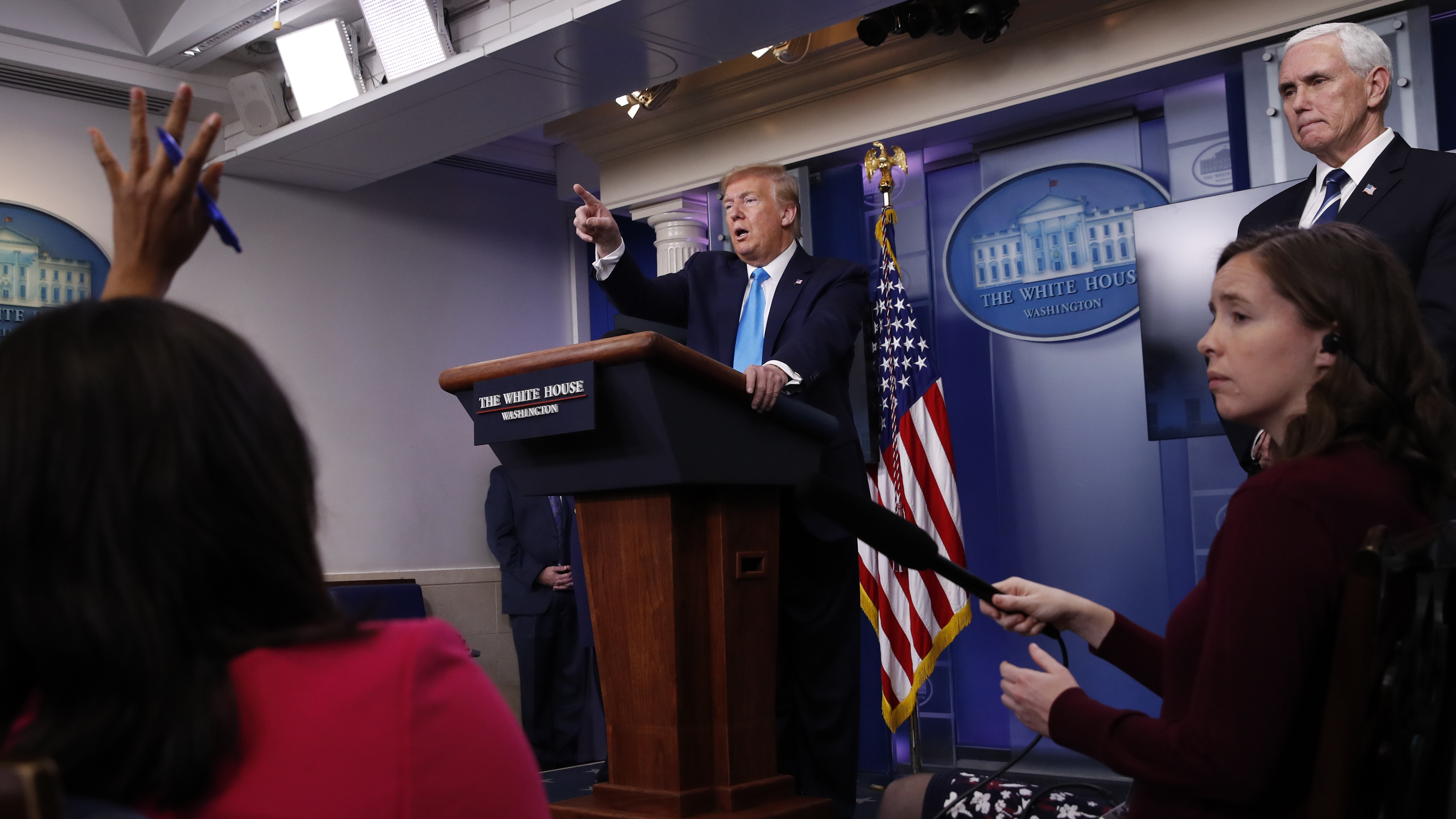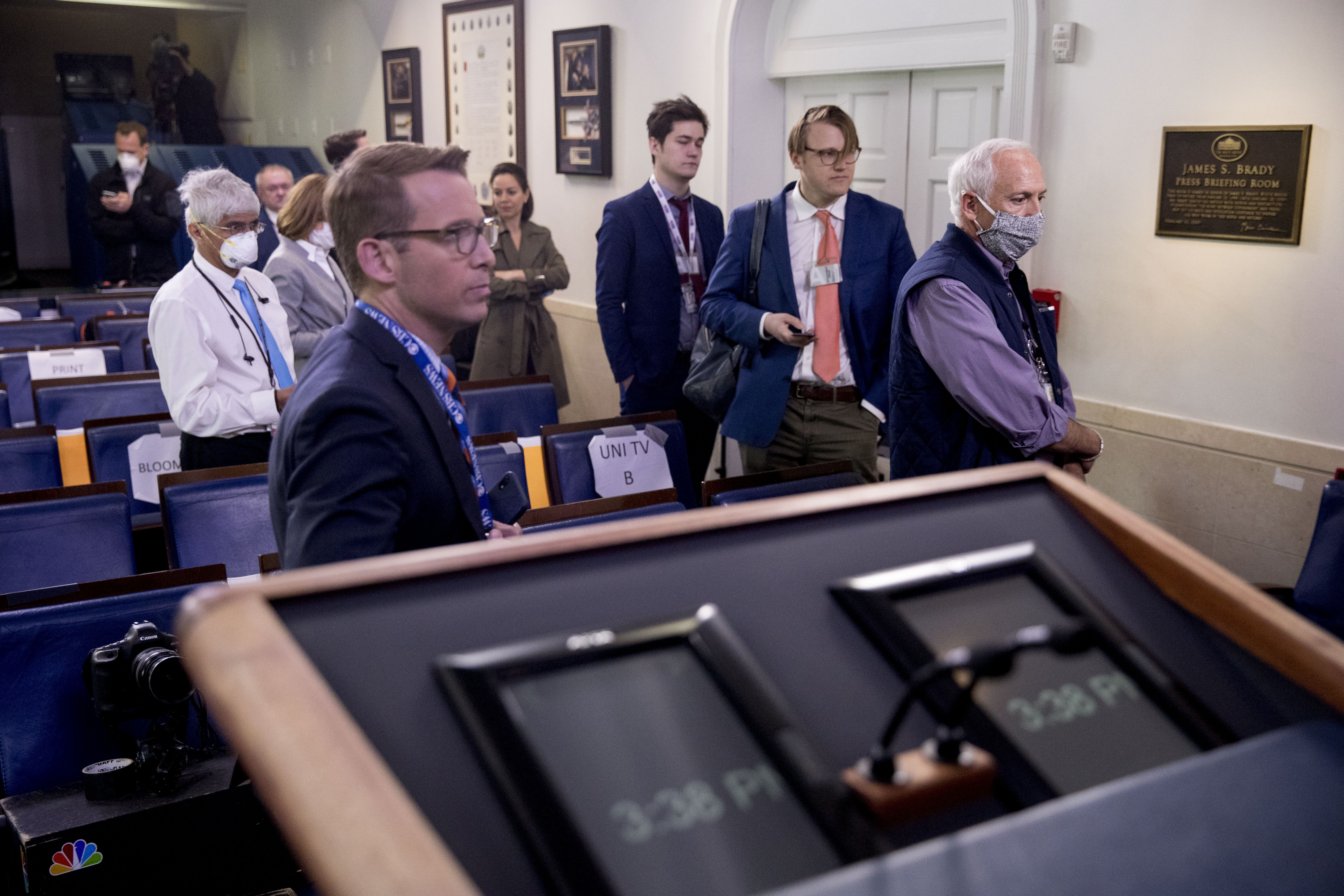
U.S. President Donald Trump calls on a reporter for a question as he speaks about the coronavirus in the James Brady Press Briefing Room of the White House in Washington, DC, U.S., April 7, 2020. /AP
U.S. President Donald Trump calls on a reporter for a question as he speaks about the coronavirus in the James Brady Press Briefing Room of the White House in Washington, DC, U.S., April 7, 2020. /AP
Editor's note: Tom Fowdy is a British political and international relations analyst and a graduate of Durham and Oxford universities. He writes on topics pertaining to China, the DPRK, Britain and the U.S. The article reflects the author's opinions, and not necessarily the views of CGTN.
On May 8, the U.S. immigration department announced that it was tightening visa rules for Chinese nationals entering the country on journalist visas.
The new rules now see the duration of such visas reduced to 90 days and any extensions subject to a review, than being automatically renewed as prior. The rule applies to all Chinese citizens applying, irrespective of what media outlets they work for.
In justifying the policy, officials claimed that the move was a response to "an increasing lack of transparency" in reporting from China, arguing it was to encourage greater freedom of the press in the country, citing the recent expulsion of U.S. journalists which had come as a retaliatory consequence of the White House doing the same to Chinese journalists.
The Trump administration seems to believe it can greater promote freedom of the press in China by placing greater restrictions on Chinese journalists at home. It can't. In doing so, it is waging a race to the bottom against Beijing. Despite what it claims, this is a move by the White House which targets and disadvantages all Chinese people, illustrating its blanket scapegoating of the country and Cold War playbook. Both countries have a lot to lose by doing this, and Washington should consider the consequences of this path.
Freedom of the press is perhaps the longest standing legal principle of the United States.
The first amendment to the U.S. constitution is an ideal which many in the country are proud of. Chief Justice Charles Evans Hughes describes the "press" as "every sort of publication which affords a vehicle of information and opinion, irrespective of what it might say. In doing so, can one really begrudge the fact that the United States has sought to promote this principle around the world? Not least of course in China which operates according to a different political system.
Yet that is not what the U.S. administration is doing now.

Members of the media wait in line to receive a test for COVID-19 by the White House Medical Unit before attending a news conference with President Donald Trump in the press briefing room at the White House in Washington, DC, U.S., April 9, 2020. /AP
Members of the media wait in line to receive a test for COVID-19 by the White House Medical Unit before attending a news conference with President Donald Trump in the press briefing room at the White House in Washington, DC, U.S., April 9, 2020. /AP
In many ways the Trump presidency has sought to undermine freedom of the press within the United States by attacking outlets who promote critical coverage of him as "fake news" and fostering a culture of misinformation.
As his administration has simultaneously promoted greater hostility to China, it has also increased its attacks on Chinese media outlets based in the United States under the premise of "promoting freedom of the press"-- which has included the forced registering of given outlets as foreign agents, diplomatic missions and of course the expulsion of journalists.
In doing so, it is only inevitable that China has retaliated. Although these moves were in response to given acts by the White House, the media has continued to portray it in one-sided times which has allowed the administration to continue pushing its narrative. This of course is not encouraging greater freedom of the press in China at all, but is in fact obligating Beijing to respond in turn and defend its interests. The result is a continual race to the bottom, and the White House refuses to admit its mistakes and insists upon having the last word.
This latest move is contemptible. It doesn't apply just to given media outlets, it applies to all Chinese nationals from the mainland and media organizations they work for.
In doing so, it deliberately seeks to put up barriers and make it harder for Chinese people to pursue a journalistic career in the United States, thus the administration in the process is betraying its own principles. It is masking a contempt and Cold War suspicion of China behind a feigned concern for "freedom of the press." In more than a few areas, the United States is becoming an increasingly hostile place for Chinese people to work, live and study in any capacity.
Given this, the United States cannot lead on freedom of the press if it is trying to lock Beijing into a race to the bottom on press freedom. They are the ones which opened up this "media war" several months ago and have refused to take responsibility for their own actions and the repercussions of which American journalists are suffering from. This path will not create the changes in China they want to see, nor will it be to America's own interest.
A feasible media environment can only be established through trust and diplomatic compromise, and with an administration which is intent on pursuing hostility towards China on every level, this is simply impossible.
(If you want to contribute and have specific expertise, please contact us at opinions@cgtn.com.)